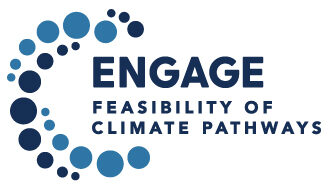Capacity Building
Workshops
Topic selection for capacity building workshops
Capacity building activities are undertaken as part of ENGAGE to ensure that less experienced teams of the consortium can learn about the new and upcoming modelling methodologies and strengthen their modelling infrastructure by learning from the more experienced teams. These sessions are typically held back to back with the project meetings. Recently, due to restrictions imposed by COVID-19, we have started organizing online workshops for this purpose.
The topics for capacity building workshops are chosen based on general consensus of the consortium. Based on our experience in previous projects (such as CD-LINKS and COMMIT) as well as topics suggested during the ENGAGE Kick-off meeting in September 2019, an initial list of topics to be covered in capacity building sessions was prepared and circulated among the consortium members. They were asked to express their preferences for the topics. These preferences inform the choice of topics that shall be covered in the capacity building workshops.
First capacity building workshop – 20 March 2020
As part of ENGAGE, the first capacity building workshop was held virtually on 20 March 2020 on inclusion of air pollution in Integrated Assessment Models. The focus of the workshop was twofold- (a) to portray the level and detail of analysis possible through air pollution models like GAINS, and (b) to identify the avenues through which air pollution models can be linked with energy-economy models. The workshop received great interest from the consortium particularly from the teams in Japan and other South-East Asian countries.
Second capacity building workshop – 13 May 2020
A virtual workshop was held on 13 May 2020 to introduce Integrated Assessment modellers to the common IAM documentation hosted by the Integrated Assessment Model Consortium (IAMC). The recording of the meeting is available below, and the presentation can be found here. If you want to add documentation for your model to the wiki, please contact Mathijs Harmsen.
Third capacity building workshop – hosted by NREL –
4 & 6 May 2021
The recordings and preparatory material for this workshop can be found here.
Fourth capacity building workshop: Good Practices in Modeling
Tuesday, February 1, 2022
The recordings and preparatory material for this workshop can be found here.
Fifth capacity building workshop: Feasibility and the NExus Solutions Tools
Friday, October 21, 2022
The preparatory material, tools, and resources for this workshop can be found here.
NAVIGATE-ENGAGE Summer School 2023
The ENGAGE summer school, organized in cooperation with the NAVIGATE project, was held at Lake
Como in July 2023, and hosted 25 students from 13 countries, including Brazil, China, Lebanon, South
Korea, and many others. The school courses, taught by key scientists involved in the ENGAGE project,
covered topics like IAM History and their Role in Climate Negotiations, Ex-ante Socioeconomic Assessment
of climate policies with IAMs, and Just transitions towards net-zero emissions. The students carried out
hands-on exercises with analysis tools for IAM output, and developed new components for IAM models.
For more information and to access the lecture recordings, please visit the following page.
Research Exchange Programme
The research exchange program enabled 11 young scholars from varied institutes globally to
collaborate with project institutions to research topics such as the sustainable transition of the agricultural
sector into global integrated assessment models, scenarios for ammonia use in the Chinese shipping
sector, and learning to work with open-source modeling tools.
Other Training Material
CD-LINKS summer school – July 2019
The CD-LINKS Summer School was held in Venice in July 2019, and covered the topic of Integrated Assessment Models as a tool for science-based policy making. More information, including videos and reading material, can be found on the CD-LINKS website.
Presentation by Heleen van Soest (PBL Netherlands Environmental Assessment Agency) at the CD-Links capacity building workshop, 22 March 2018, New Delhi:
Useful Tools and Links
IAMC
IAMC homepage: https://www.iamconsortium.org/
Common Integrated Assessment Model (IAM) documentation
IAMC tools on GitHub: https://github.com/IAMconsortium
SENSES tool kit
These modules help you understand and communicate climate change scenarios. The modules use visualisations to explain and explore scenarios. The target audiences for these videos are the finance and policy sectors, and regional decision-makers.
https://climatescenarios.org/
pyam: analysis and integration of integrated assessment scenarios
Pyam is an open-source Python package with a suite of tools for analyzing and visualizing input data and reults of IAM scenarios, energy systems, and sectoral studies.
https://pyam-iamc.readthedocs.io/en/stable/

